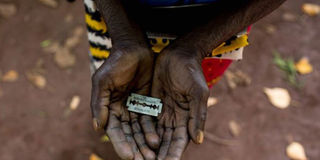For women’s Day...

She promises to show me a circumcised woman from among the crowd of farmers who had gathered for a meeting in that area (we both got too busy and forgot to search).
When I met Esther, my eyes started searching. I looked keenly at different parts of her body that were not covered by clothing. I tried not to be too obvious, but I am sure this is something she is accustomed to either by curious strangers like myself or her tribemates. Using my eyes was to save me from the question I wanted to ask her so badly.
In fact, the moment I knew I was scheduled to visit her home area, I started planning how to find someone whom I could speak to about the subject of my wondering eyes. “Those markings are usually very visible. I don’t have them because I have never been part of the ritual,” Esther later told me.
She promises to show me a circumcised woman from among the crowd of farmers who had gathered for a meeting in that area (we both got too busy and forgot to search). We were sitting under a tree on the hills of Kapnarkut in Kapchorwa. The shade was a saviour from the scorching sun.
The mother of three, a barley farmer in her late 30s, thanks God every day that her family saved her from the trauma of female genital mutilation (FGM).
“But if you are not careful, they can kidnap you and circumcise you forcefully,” she says.
The thought of this sent shivers down my spine. FGM, although illegal, continues to be a cruelty melted on girls in some parts of eastern and northeastern Uganda.
“The advocates against FGM have been silent in the last couple of years. I recall when they used to move from home to home telling families about the ills of this traditional practice, but not now.” I could read both sadness and disgust in Esther’s voice as she lamented on the recent increase in FGM among the Sabiny. She has come to learn how to live with the segregation that comes with rejecting the practice, a thing she says many families fear.
“If you go to public traditional functions, they keep looking at you to see if you have the markings of a circumcised women. In case there is a dance being performed, you are not allowed to dance with your husband. I think many women fear this,” she says.
Although she narrates this to me, she is amused by such actions. “You see the dangers of being ignorant and illiterate!” she muses. Married at 20, just after her vocational training as a primary school teacher, her mission, she believes, is to guard her daughters against the practice. Her husband, a teacher and farmer as well, shares her line of thought on FGM.
“But look at these hills, it is not easy to be safe if you are in the communities in the remote areas and are not educated,” she tells me. Like is typical and who can blame her, she calls the government to intervene. Yes, it is yet again another issue of “Gavumenti Etuyambe”.
As we commemorate Women’s Day next week, injustices and violence against women such as these will be highlighted. But then again what happens after March 8, or this month?
Women such as Esther live in fear of their daughters being violated, how is it that it is business as usual in so many other places in Uganda? If we are to be change agents, we need to concern ourselves with injustices beyond our comfortable spaces, for you just never know what the ripple effects will be.




